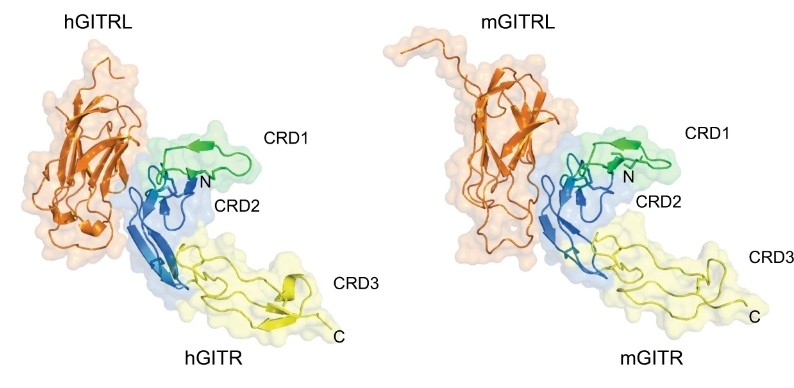Creative Biolabs provides our customers with knowledge sharing related to immune checkpoint ligands GITRL to explore the complexities and unveil the role of GITRL.
The immune system is a complex and dynamic network that coordinates the body's defense mechanisms against foreign agents such as pathogens, cancer cells, and other abnormal cells. Immune checkpoint receptors and ligands play a critical role in regulating the immune response by maintaining a balance between activation and suppression of immune cells. Among these checkpoint receptors and ligands, the glucocorticoid-induced tumor necrosis factor receptor (GITR) and its ligand GITRL have emerged as promising targets for cancer immunotherapy.
GITRL, also known as TNFSF18, is a member of the tumor necrosis factor (TNF) superfamily, a group of cytokines that regulate immune cell function and survival. GITRL is expressed on the surface of various immune cells, including dendritic cells, macrophages, B cells, and T cells, and is involved in the regulation of T cell activation and differentiation.
 Fig.1. Individual human GITR-GITRL and mouse GITR-GITRL heterodimers.1,2
Fig.1. Individual human GITR-GITRL and mouse GITR-GITRL heterodimers.1,2
GITRL binds to its receptor GITR, which is expressed on the surface of regulatory T cells (Tregs) and effector T cells. The interaction between GITRL and GITR promotes the activation and proliferation of effector T cells and enhances their ability to kill cancer cells. At the same time, the GITRL-GITR pathway inhibits the suppressive function of Tregs, leading to the activation of antitumor immune responses.
The convoluted intricacies of the GITRL-GITR pathway have elicited much interest in its potential as an enticing target for the purview of cancer immunotherapy.
We offer a wide range of research services to support GITRL-related research and drug development. Our team of experts has extensive experience in the design, production, and characterization of recombinant proteins and antibodies.
In addition to the research services mentioned earlier, Creative Biolabs offers a wide range of additional GITRL-related services to support research and drug development efforts, including bioinformatics analysis, high-throughput screening, protein engineering, PK/PD studies, in vitro and in vivo assays, toxicology studies.
Creative Biolabs has extensive experience in the field of immunotherapy, and we are dedicated to advancing the development of new and innovative immune checkpoint therapies for cancer and other diseases.
References
All listed customized services & products are for research use only, not intended for pharmaceutical, diagnostic, therapeutic, or any in vivo human use.
USA
Tel:
Fax:
Email:
Copyright © 2026 Creative Biolabs. All Rights Reserved.